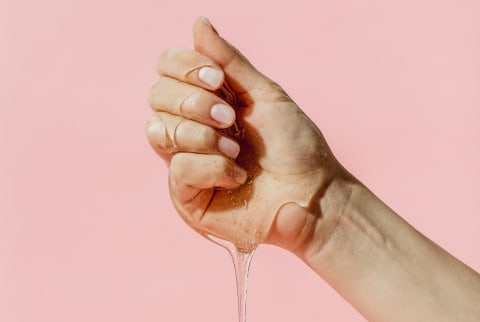3 Things Getting In The Way Of Having Softer, Hydrating Hands


As those with perpetually dry, rough hands know: It’s a real struggle to keep the skin adequately hydrated. If I’m not slathering them with a hand cream multiple times a day, then my skin almost instantly turns crickley and flaky.
My skin is just naturally dry and sensitive—all over, but most specifically on my hands. (I’ve written about my “old-looking hands before.” It’s my lot in life, I guess.) Even with my best efforts, I still will likely deal with patches of dehydrated skin.
So here are a few hand care habits I’m particularly aware of, and that you may want to reevaluate within your own routine. If you’re experiencing increased dryness on the hands, it could be these three culprits.
Washing with harsh soaps
Lots of people now know the importance of washing their faces with gentle, sulfate-free cleansers. But we really should be taking that same lesson to the rest of the body, hands included.
Sulfates are harsh detergents that disrupt the microbiome, strip the skin of its protective barrier, and can trigger inflammation. This is why most beauty companies have started moving away from the ingredient, and formulating with gentle cleansing ingredients instead (why you see more and more sulfate-free shampoos and face washes!).
However they’re still quite ubiquitous in the hand care space. While you can’t always control what hand wash you’re using (public bathrooms, for example), I do recommend switching to a sulfate-free hand wash in your home, such as mindbodygreen’s postbiotic hand wash.
Look for plant-based surfactants such as Cocamidopropyl Betaine, Sodium Methyl Oleoyl Taurate, and Sodium Cocoyl Glycinate (although there are many more sulfate alternatives—too many to list—so just look for brands that note the formula is sulfate-free). Bonus points if the hand soap is formulated with moisturizing ingredients as well, such as aloe, glycerin, and botanical oils.
Skipping SPF on the hands
Folks are always looking for magical, do-it-all products that can solve just about any skin issue. Well, we’ve had it this whole time: Sunscreen.
Sunscreen can shield your skin from inflammation, dryness, premature aging, and all the myriad issues that come with prolonged, unprotected UV exposure. "The DNA in skin cells gets damaged when the skin is unprotected and exposed to UVA and UVB radiation from the sun," explains Jodi LoGerfo, DNP, who is a doctor of nursing practice and a family nurse practitioner certified in family medicine and dermatology.
And while there’s certainly more awareness about the benefits of wearing sunscreen daily, most folks only apply it on the face. But the hands are often just as exposed to UV rays as the face.
So when applying your sunscreen, be sure to coat the back of the hands as well. If you find yourself forgetting this crucial step, keep a bottle of sunscreen at your front door (where you keep your keys, for example) to serve as a reminder to apply before leaving your home. Or for those who spend significant time in cars, keep a bottle in the glove compartment to re-apply midday.
Not protecting the skin barrier & biome
Hands get exposed to a lot. This is especially true if you work with your hands, but even day-to-day chores can lead to damage. For example, cleaning and disinfecting products are often highly irritating to the skin, especially if the skin is not protected.
The best thing to do is wear gloves when you know your hands will be exposed to drying ingredients (such as dishwashing), but you should also use barrier-supporting topicals.
Hand creams that strengthen the barrier can help your skin become more resistant to damage and irritation. For example, the skin microbiome plays a critical role in your skin’s immune function by crowding out potentially pathogenic bacteria.
You can support your skin barrier function and biome by using biotic-friendly ingredients. For example, pre and postbiotics can balance and nurture the skin barrier. mindbodygreen’s postbiotic hand cream contains biotech that are shown to improve skin firmness, help with wrinkle prevention and reduction, as well as support epidermis framework regeneration.
This comes with the added bonus of improved, sustained hydration. When the skin barrier is strong it’s better at holding water in the epidermis, resulting in softer, more supple skin.
The takeaway
Certain daily, common habits can make your hands dry out faster. But with a few tweaks to your routine, you can better protect the skin on your hands from damage. And if this all has you thinking you need a new hand cream, check out our favorite options here.

Alexandra Engler is the beauty director at mindbodygreen and host of the beauty podcast Clean Beauty School. Previously, she's held beauty roles at Harper's Bazaar, Marie Claire, SELF, and Cosmopolitan; her byline has appeared in Esquire, Sports Illustrated, and Allure.com. In her current role, she covers all the latest trends in the clean and natural beauty space, as well as lifestyle topics, such as travel. She received her journalism degree from Marquette University, graduating first in the department. She lives in Brooklyn, New York.

